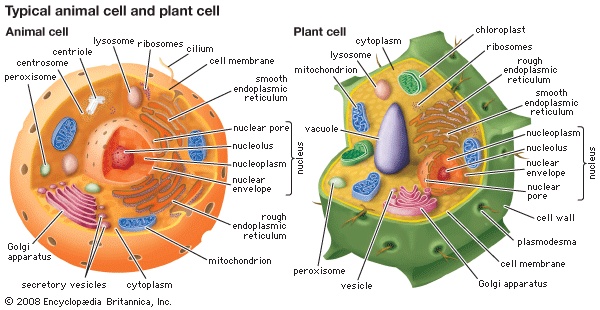cytology
biology
 the study of cells (cell) as fundamental units of living things. The earliest phase of cytology began with the English scientist Robert Hooke's (Hooke, Robert) microscopic investigations of cork in 1665. He observed dead cork cells and introduced the term “cell” to describe them. In the 19th century two Germans, the botanist Matthias Schleiden (Schleiden, Mathias Jacob) (in 1838) and the biologist Theodor Schwann (Schwann, Theodor) (in 1839), were among the first to clearly state that cells are the fundamental particles of both plants and animals. This pronouncement—the cell theory—was amply confirmed and elaborated by a series of discoveries and interpretations. In 1892 the German embryologist and anatomist Oscar Hertwig suggested that organismic processes are reflections of cellular processes; he thus established cytology as a separate branch of biology. Research into the activities of chromosomes led to the founding of cytogenetics, in 1902–04, when the American geneticist Walter Sutton (Sutton, Walter S(tanborough)) and the German zoologist Theodor Boveri (Boveri, Theodor Heinrich) demonstrated the connection between cell division and heredity. Modern cytologists have adapted many methods of physics and chemistry to investigate cellular events. See also cell.
the study of cells (cell) as fundamental units of living things. The earliest phase of cytology began with the English scientist Robert Hooke's (Hooke, Robert) microscopic investigations of cork in 1665. He observed dead cork cells and introduced the term “cell” to describe them. In the 19th century two Germans, the botanist Matthias Schleiden (Schleiden, Mathias Jacob) (in 1838) and the biologist Theodor Schwann (Schwann, Theodor) (in 1839), were among the first to clearly state that cells are the fundamental particles of both plants and animals. This pronouncement—the cell theory—was amply confirmed and elaborated by a series of discoveries and interpretations. In 1892 the German embryologist and anatomist Oscar Hertwig suggested that organismic processes are reflections of cellular processes; he thus established cytology as a separate branch of biology. Research into the activities of chromosomes led to the founding of cytogenetics, in 1902–04, when the American geneticist Walter Sutton (Sutton, Walter S(tanborough)) and the German zoologist Theodor Boveri (Boveri, Theodor Heinrich) demonstrated the connection between cell division and heredity. Modern cytologists have adapted many methods of physics and chemistry to investigate cellular events. See also cell.- dwarf mistletoe
- dwarf planet
- Dwarf planets
- dwarf star
- Dwarka
- D W Griffith
- Dwiggins, William Addison
- Dwight D. Eisenhower
- Dwight D. Eisenhower: Atoms for Peace
- Dwight D. Eisenhower: Farewell Address
- Dwight D. Eisenhower: First Inaugural Address
- Dwight D. Eisenhower: Second Inaugural Address
- Dwight F. Davis
- Dwight, John
- Dwight L Moody
- Dwight, Timothy
- Dwight W Morrow
- Dworkin, Andrea
- dyal
- dyarchy
- dybbuk
- Dyce, Alexander
- Dyce, William
- Dyckia
- dye